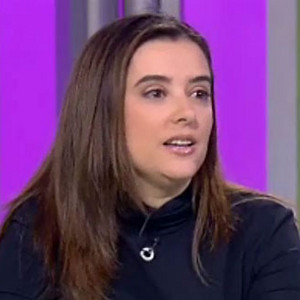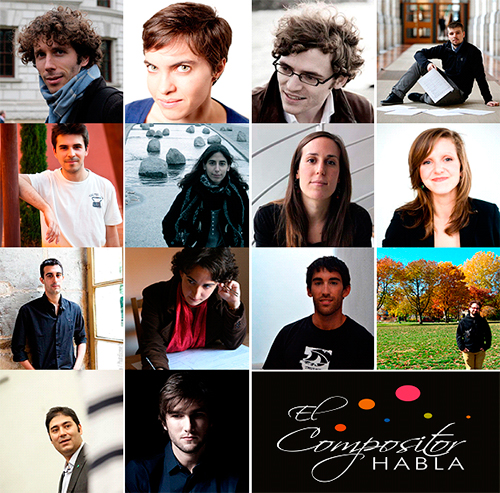Artistas
María de Alvear (Compositora)
María de Alvear | World Edition Project 9-Interview with Kirsten Reese
02/12/2019Hace unos meses salió publicado el CD «The Lightest Words» de Kirsten Reese en World Edition, un trabajo fascinante del que hemos querido hablar con la compositora.
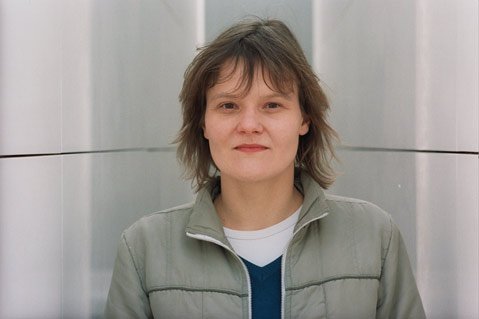 Reese estudió flauta, música electrónica y composición y vive en Berlín, donde enseña composición electroacústica en la University of the Arts. En sus obras, Reese a menudo se centra en aspectos performativos y narrativos, como es el caso de las tres piezas de este CD. La primera pista "the lightest words had the weight of oracles" (las palabras más claras tenían el peso de los oráculos) presenta el color de tono histórico y específico del sintetizador Fairlight CMI (interpretado por Sebastian Berweck) y lo conecta con los sonidos de una guitarra eléctrica (interpretada por Seth Josel). En contraste, "KSH - Portrait des Pianisten als junger Mann" es un retrato sonoro muy personal de un músico, para el cual Reese trabajó en estrecha colaboración, el pianista Klaus Steffes-Holländer. La última pista en "The Lightest Words" es "inyib", una mezcla de varias capas de sonido acústico y electrónico que construyen una metáfora asociativa. Lo realiza el conjunto "zeitkratzer". Los textos que acompañan al cd son de Christian Grüny, Christa Brüstle, Bernd Künzig y Reinhold Friedl.
Reese estudió flauta, música electrónica y composición y vive en Berlín, donde enseña composición electroacústica en la University of the Arts. En sus obras, Reese a menudo se centra en aspectos performativos y narrativos, como es el caso de las tres piezas de este CD. La primera pista "the lightest words had the weight of oracles" (las palabras más claras tenían el peso de los oráculos) presenta el color de tono histórico y específico del sintetizador Fairlight CMI (interpretado por Sebastian Berweck) y lo conecta con los sonidos de una guitarra eléctrica (interpretada por Seth Josel). En contraste, "KSH - Portrait des Pianisten als junger Mann" es un retrato sonoro muy personal de un músico, para el cual Reese trabajó en estrecha colaboración, el pianista Klaus Steffes-Holländer. La última pista en "The Lightest Words" es "inyib", una mezcla de varias capas de sonido acústico y electrónico que construyen una metáfora asociativa. Lo realiza el conjunto "zeitkratzer". Los textos que acompañan al cd son de Christian Grüny, Christa Brüstle, Bernd Künzig y Reinhold Friedl.Hemos hablado con ella y esto es lo que nos ha contado...
1. Ruth Prieto: World Edition has just published an album written by you «The Lightest Words». What can you tell us about this CD?
Kirsten Reese: It contains three works composed for instruments and electronics in very different ways, all interpreted by well-known musicians in their field.
.jpg) 2. R.P.: What are we going to discover in this work?
2. R.P.: What are we going to discover in this work? Kirsten Reese: The compositions are all very different. A more abstract piece with pure electronic sounds, a piano piece for the performer and his instrument focussing on the interplay of piano music and objects sonores and a piece mixing instrumental sound gestures and media sounds. Texts in the booklet are also of different formats, a more aesthetic/philosophical text, an interview/discussion about the second piece, and a text focussing on the composition process with regards to the musicians connected to the thrid piece.
3. R.P.: Who is Kirsten Reese and which characteristic defines you best?
Kirsten Reese: I am a composer and sound artist, who composes for all forms and genres of electronic media, often creating unusual site-specific and set-up specific works, for example historic instruments, works in public spaces or landscapes, recently a composition/performance in a swimming pool for underwater listening...
4. R.P.: «The Lightest Words had the weight of oracles» is a work of 2014/2016 what can you tell us about this work?
Kirsten Reese: When I discovered the historic Fairlight synthesizer, one of the first digital synthesizers from the 1980ies, in the university studio where I teach, I explored its sounds in many night sessions. From my improvised sound sequences I derived a guitar score, mapping these sounds. Then I made a composition of many short pieces where synthesizer and electric guitar morph into each others sounds and complement each other.
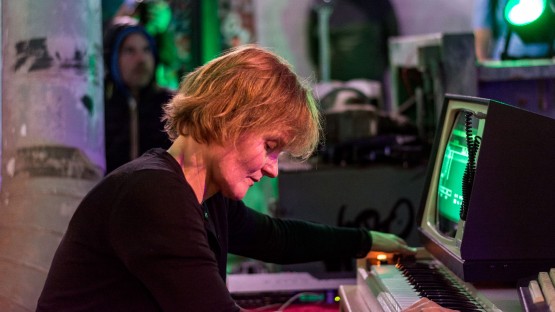 5. R.P.: On the notes that accompany the CD we read: “The promise of sound synthesis was total control paired with the greatest possible freedom”. Could you explain to us the meaning behind these words to describe your music?
5. R.P.: On the notes that accompany the CD we read: “The promise of sound synthesis was total control paired with the greatest possible freedom”. Could you explain to us the meaning behind these words to describe your music?Kirsten Reese: This is from the time when the Fairlight was developed in the 1980ies. Today we associate artistic freedom with the fact that all digital tools are potentially available on one small laptop, all sound libraries and music is available on the internet. But there is a freedom connected to composing with limitations, by concentrating on a specific sound world and specific ways of workflow an instrument offers - like in this composition. Although by technological standards the Fairlight is completely outdated, it is still a beautiful sounding instrument with many possibilities - some very particular and unique, like the interfaces for sound synthesis and for controlling micro-loops, that can be explored and turned into music.
6. R.P.: What inspires you as an artist and why?
Kirsten Reese: I am inspired by listening to the atmosphere, structure and uniqueness of sounds that I record or focus on, instrumental sounds, noises and objets sonores, field recordings. I am also inspired by places, as acoustic, historic and social spaces. And by people, musicians and their experience and personality.
7. R.P.: There is another piece of 2014/2016 «Portrait of a pianist as a young man». What can you tell us about this work?
Kirsten Reese: It is a narrative piece dealing with memories, in regards to learning and performing an instrument, but also in shaping ideas and interests as a young person. This is exemplified by the piano and the pianist. A focus also lies on combing sounds of objects, musique concrete and instrumental sounds.
8. R.P.: In this personal "inventory" that we all have of noises, sounds, music and songs, what can you tell us about your soundscape?
Kirsten Reese: Well, like for all of us it is a big mix of sound and musical experiences throughout our life - for me: growing up as a child in the soundscape of Hong Kong and the Philippines, playing and studying classical flute, sicovering the contemporary new music repertoire and thinking, Berlin clubs in the 90ies, theatre music, soundscapes and field recordings in different countries...
9. R.P.: What are your musical roots (real or imaginary)?
Kirsten Reese: My background is classical music, early on I got interested in new and experimental music. And of course all genres of electronic music.
10. R.P.: The album is completed by a third work « inyib» composed in 2002. What can you tell us about this work?
Kirsten Reese: This is an earlier composition. It also involves the personality of the musicians, part of the famous zeitkratzer Ensemble, who contributed with their personal instrumental and media sounds. It is an imaginary network piece, because no actual technological networking takes place, it is all about co-presence (of sounds all over the world) and coincidence.
11. R.P.: Has your music changed a lot in these years? and you?
Kirsten Reese: Yes and no - my music takes shape in many different genres - and these are constantly evolving. In fact the forms and formats are a main part of the articulation of my artistic practise. But there is probably something that is present constantly - maybe a certain subtleness and refelctiveness rather than loud outburts of expression...
12. R.P.: Can you define contemporary? And, in which way Kirsten Reese is contemporary?
Kirsten Reese: See above - developing new forms and constellations of sound, musicians, spaces, society...
13. R.P.: Where are you right now as a composer?
Kirsten Reese: I want to develop larger works, with larger production budgets...
14. R.P.: What is missing today in the dissemination of music of present-day creation? Does it reach a sufficiently wide audience?
Kirsten Reese: Here in Berlin where I live we are priviledged to have a big scene of many music-artists of many genres and interests. I also think that present-day music should speak for itself - it has to believe that it can generate interest by what it is doing. And while I feel that there has been a lack of interest in and knowledge about the intellectual contemporary music scene from the side of artists from other fields, this is changing. There is very much a growing interest in sound in all artistic fields - this can be very productive.
15. R.P.: It is still necessary to make visible women in music?
Kirsten Reese: Yes. Definetly in the so-called new music, and in the electronic field and especially maybe in 'old Europe'.
Kirsten Reese es una compositora y artista sonora afincada en Berlín. Reese crea música experimental para electrónica e instrumentos, instalaciones audiovisuales y trabajos performativos con medios electrónicos. Sus obras han sido presentadas en conciertos, galerías y festivales nacionales e internacionales tales como Donaueschinger Musiktage 2006, Festival Rümlingen 2007 y 2010, Wittener Tage für Neue Kammermusik 2011. Ha recibido numerosas becas y residencias (del Senado de Berlín; Stiftung Kulturfonds 2001 ; Cité des Arts Paris 2006, Villa Aurora Los Angeles 2009). En 2010 fue nominada para Deutscher Klangkunstpreis. En 2010 impartió clases en la Universidad de las Artes de Berna en el programa de música y arte multimedia. Hasta 2007 fue profesora de investigación en la Hochschule für Musik und Theater Hamburg. Reese actualmente enseña en la Universität der Künste Berlin.
Photos of Kirsten Reese by Katrin Thomas and Golo Föllmer and has been provided by the composer for this interview.
More information on the CD at the publisher World Edition
More information on the composer's website Kirsten Reese
Destacamos ...
Nueva Sección Directorio
dedicada a la promoción de compositores, intérpretes, instituciones y editoriales.
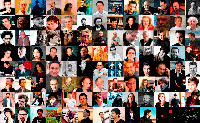
dedicada a la promoción de compositores, intérpretes, instituciones y editoriales.


